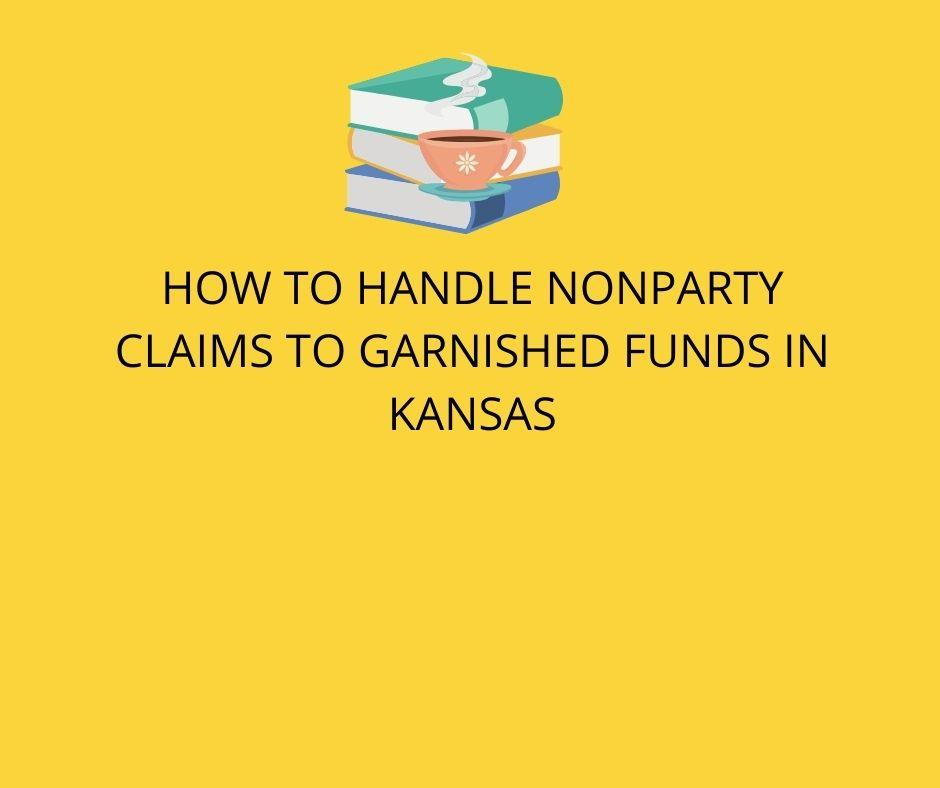
- posted: Sep. 01, 2020
I had a recent situation where a non-party was claiming an interest in a bank garnishment. I was contacted by someone claiming they were a fiancé’, alleging her husband-to-be kept the funds in a joint account with the father, who was the judgment debtor. This person was telling me that the funds were not the father’s and the garnished was “illegal.” However, the father took no action with the court to make this assertion. The garnishment captured the amount of the judgment.
I want to share with you some research I came across when a nonparty attempt to make a claim for garnished funds.
First, some Kansas civil procedure. Immediately after the garnishee/bank has been served, the judgment creditor must give the judgment debtor notice that: (1) the order has been served; (2) he or she has a right to demonstrate the subject property is exempt from garnishment; and (3) he or she has a right to request a hearing on such an exemption claim. K.S.A. 2019 Supp. 61-3508(a). This is usually done with a form mailed to the judgment debtor. The form is available at the Kansas Judicial Council website: https://www.kansasjudicialcouncil.org/legal-forms/civil-actions.
The judgment debtor must request a hearing within 14 days after receiving notice from the judgment creditor. K.S.A. 2019 Supp. 61-3508(b). This is part of the form, and the judgment debtor is supposed to contact the court to get a court date, fill out the form and return it to the judgment creditor.
If a hearing is held, he or she has the burden of showing some or all of the subject property is exempt from garnishment. After the hearing, the district court must enter an order “determining the exemption and such other order or orders as is appropriate.” K.S.A. 2019 Supp. 61-3508(c). Stormont-Vail Healthcare, Inc. v. Sievers, 463 P.3d 431, 434 (Kan.App., 2020)
However, a third-party claiming ownership in garnished funds does not follow this procedure. Third parties are not controlled by the fourteen-day requirement applicable to judgment debtor’s claim of exemption. Bartlett Co-op. Ass'n v. Patton, 722 P.2d 551, 553–54, 239 Kan. 628, 630 (Kan.,1986).
Instead, any interested person, seeking the garnished funds has to affirmatively have the garnishment dissolved. K.S.A. 60–712(a):
60-712. Dissolution of attachment; hearing
(a) Motion to dissolve, how made. In all cases where property, effects or credits shall be attached, any interested person may file a motion to dissolve the attachment, verified by affidavit, putting in issue the sufficiency of the proceedings, the defendant's or other person's claim of exemption as to any property which has been attached, or the truth of the facts alleged in the affidavit on which the attachment was issued. The court shall hold a hearing on the motion within seven days after the receipt thereof. The burden of proof shall be on the party seeking the attachment except as to any claim of exemption.
While no time limit is specified, the intervention must be timely sought. Generally, where there are no time provisions in the statute, the application must be made before the garnishment is satisfied. Dailey v. Walden, 648 P.2d 258, 261, 7 Kan.App.2d 712, 715 (Kan.App., 1982). And a motion for return of garnished funds may be treated the same as an application to intervene in a post garnishment proceeding: the Dailey v. Walden case found a motion for return of garnished funds is the equivalent of a motion to intervene. But it found such a motion was not timely filed and should not have been granted, where the garnishment funds had already been paid over to plaintiffs in satisfaction of their garnishment request.
Conclusion
In my case the judgment debtor did not request a garnishment hearing. After 14 days expired (plus 3 additional days for mailing), we filed a payout order, requesting the court order the bank pay the funds to the judgment creditor. After that step was completed, waited some more additional time for the funds to clear. Then, a satisfaction of judgment was filed.
The nonparty never took any further action. But if they did, I would have raised the above arguments. And contend since the funds were paid out by the bank, and the judgment satisfied, the court should deny the request.
The answer to this garnishment issue is not easy to discover. I wanted to share this in the event you may face this issue in the future.

